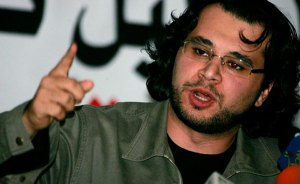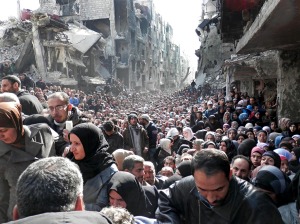 par Tamim Barghouti, traduit par Eric Lamy
par Tamim Barghouti, traduit par Eric Lamy
À trois reprises, les médias furent trompés : “la gravitė de la famine était exagérée”, “les témoins oculaires mentaient” et “les victimes de la faim n’avaient faim que de célėbrité”. Dans ces trois cas précis, les forces assiégeantes mangèrent et burent devant les caméras des reporteurs, juste à côté du camp, pour mieux humilier et insulter ceux qui y vivaient.
Le camp de réfugiés de Yarmouk (à Damas) est assiégé depuis des mois, soumis à des bombardements terrestres ou aériens. De nombreux réfugiés sont morts de faim, n’ayant d’autre ressource que de se nourrir de feuilles ou de cactées ; le manque d’eau potable à également entraîné des affections intestinales et des maladies de peau.
Des nouveaux-nés ont péri de même, ainsi que leurs mères, des personnes âgées, des malades et des blessés, à cause du manque de médicaments. Toute personne qui essaie de quitter le camp est abattue, et le camp à été bombardé à de nombreuses reprises.
Même quand le régime syrien a permis l’entrée de l’aide dans le camp (grâce à la pression des médias étrangers), il a aussitôt refermé le siège quand l’attention des médias s’est relâchée.
Les tentatives des soutiens du régime syrien pour nier leur responsabilité vis-à-vis de Yarmouk sont pathétiques : le camp jouxte Damas. L’armée syrienne est seule responsable, légalement et moralement et aussi sur le plan régional, puisqu’elle contrôle entièrement la ville.
Quoique les supporteurs du régime prétendent qu’ils ont le droit pour eux, leurs actions immondes seraient moins ignobles s’ils ne prétendaient pas les accomplir au nom d’une cause prétendue.
Pour ce qui est d’affamer les Palestiniens, le régime syrien en a une longue expérience, peut-être même la plus accomplie que tout autre pays arabe. Trois des quatre pays qui entourent la Palestine ont été impliqués dans la mort de Palestiniens. Septembre, Sabra & Shatila et le blocus de Gaza… Pour autant, un seul pays sur les quatre fit couler le sang Palestinien à trois reprises : Tel Zaatar, la Guerre des Camps de réfugiés, et le camp de Yarmouk aujourd’hui.
À trois reprises, la scène se répète : le régime syrien utilise des milices alliées et leur donne l’ordre d’encercler le camp. Concernant le camp de Tel Al-Zaatar (1976), Damas a utilisé les milices chrétiennes maronites (et notamment les Phalangistes de la plus importante milice chrétienne), sans oublier les “forces Kataeb”, les “gardiens du Cèdre” et le “mouvement Marada”.
Au cours de la Guerre de Camps (1985/1988), le régime syrien à recruté la milice shiite Amal qui était, à l’époque, en conflit armé avec le Hezbollah pour le contrôle de Beyrouth et du Sud-Liban. Le Parti de Dieu ne prit pas part à la Guerre des Camps, mais Amal ouvrit le feu sur les Palestiniens et, simultanément, attaqua le Hezbollah.
Comme aujourd’hui, le régime syrien s’appuie directement sur son armée ainsi que sur des milices Palestiniennes inféodées, comme le Front Populaire pour la Libération de la Palestine – Commandement Général (FPLP – CG) et le groupe Fatah al Intifada.
Dans ces trois différents camps de réfugiés, l’eau et l’électricité furent d’abord coupés : les gens furent privés d’approvisionnement jusqu’à manquer de tout, jusqu’à mourir de faim. Dans ces trois cas, la faim à poussé les gens à manger des feuilles et à réclamer des fatwas pour être autorisés à manger des chats, des chiens et des cadavres d’animaux. Les femmes qui s’aventuraient jusqu’aux puits et autres pompes de forage à l’extérieur du camp étaient abattues par les snipers positionnés autour du camp.
Hussein Ayyad et Maysa Khatib, habitants de Tel Al-Zaatar, ont raconté que les corps des femmes tuées par les snipers tombaient dans les puits ; les gens étaient obligés de puiser l’eau dans laquelle restaient les corps des martyres. Impossible de les en retirer car les snipers continuaient de leur tirer dessus.
Dans ces trois exemples précités, les médias furent mystifiés : l’importance de la famine était exagérée, les témoins oculaires mentaient, et les victimes de la faim n’avaient faim que de célébrité. De la même manière, les forces assiégeantes mangeaient et buvaient devant les caméras, près du camp, afin d’humilier et d’insulter plus encore les habitants du camp.
Une des chaînes de télévision libanaise qui soutient le régime syrien à diffusé un reportage sur le Camp de Yarmouk montrant les soldats loyalistes en train de manger avec un des reporters de la chaîne, niant que les habitants du camp soient affamés et imitant les scènes où du lait maternisé était gâché pendant les sièges de Sabra & Shatila et de Burj El-Barajneh (dans les années 80). Le premier, imposé par le Liban et soutenu par Israël, dura trois mois, de juin à septembre 1982. Le second, mis en place par le Liban et soutenu par la Syrie, à duré 4 ans, de 1985 à 1988.
À chaque occasion, le régime syrien s’est justifié en arguant que les Palestiniens entretenaient des opinions radicales, qu’ils étaient des résistants invétérés. Mais Damas ne s’en prit jamais à Israël, même quand l’état hébreu à bombardé Damas. À chaque fois, l’humiliation des Palestiniens relayée par les médias était un élément essentiel de la guerre livrée contre eux. Non content de démoraliser les gens dans les camps et tous ceux qui les défendaient pendant le siège, il fallait aussi salir l’image de la Palestine, des symboles politiques et culturels Palestiniens. Il fallait aussi semer la confusion dans l’opinion publique syrienne et libanaise, dans leur réaction à de telles actions et, enfin, les convaincre de ne rien tenter pour s’opposer au siège des camps de réfugiés.
 Le 9 janvier 2014, le porte parole de l’UNRWA, Christopher Gunness à déclaré que “la profonde souffrance des civils de Yarmouk s’aggrave. Les rapports confirment que la malnutrition est extrêmement répandue, de même que l’absence de soins médicaux, surtout pour ceux qui ont été blessés à cause du conflit, ainsi que les femmes prêtes à accoucher, avec des conséquences fatales pour certaines d’entre elles.”
Le 9 janvier 2014, le porte parole de l’UNRWA, Christopher Gunness à déclaré que “la profonde souffrance des civils de Yarmouk s’aggrave. Les rapports confirment que la malnutrition est extrêmement répandue, de même que l’absence de soins médicaux, surtout pour ceux qui ont été blessés à cause du conflit, ainsi que les femmes prêtes à accoucher, avec des conséquences fatales pour certaines d’entre elles.”
Le journal britannique The Guardian relate que le même porte-parole de l’UNRWA déclaré, le 9 février 2014 (un mois après sa première déclaration) que le Dr Ibrahim Mohammed, qui travaille au sein de l’UNRWA, à sauvé un bébé de 14 mois appelé Khaled, souffrant de grave malnutrition. Depuis 2 mois, ce bébé ne vivait presqu’exclusivement d’eau. Noor, sa maman de 29 ans, avoua qu’elle n’avait, pour toute nourriture, que des décoctions d’épices. Quand il n’y en eut plus, ils se mirent à manger de l’herbe, mais celle-ci vint aussi à manquer.
Dans un message attesté du Réseau Euro-Méditerranéen pour les Droits de l’Homme (REMDH), une organisation basée à Genève qui collabore avec l’UNRWA pour apporter de la nourriture au camp, le REMDH rapporte qu’une jeune fille de 15 ans, prénommée Heba et son bébé de 5 mois, à raconté au personnel des Nations Unies qui distribuaient la nourriture qu’ils n’avaient pas mangé depuis trois jours, et qu’elle n’avait pas pu donner le sein à son bébé. Quand les infirmiers donnèrent de l’eau au bébé, il se mit à gonfler, n’ayant rien avalé depuis plusieurs jours. Les infirmiers en furent si inquiets qu’un médecin de la Croix Rouge Internationale dut le prendre en charge.
Ces exemples de famine furent accompagnés, dans le passé, par le massacre de quiconque tentait de quitter le camp. Dans le cas de celui de Tel Al-Zaatar, par exemple, après avoir affamé le camp pendant des mois, les Phalangistes, soutenus par le régime syrien [de Hafez al Assad, père de Bashar] annoncèrent qu’ils allaient autoriser les Palestiniens à quitter le camp afin d’être acheminés dans des refuges de la Croix Rouge. Quand les Palestiniens commencèrent à quitter le camp, les miliciens les massacrèrent, comme le raconte Maysa Al Khatib, une des survivantes de la tuerie, dont le témoignage fut, avec celui de Hussain Ayyad, publié dans l’appendice Palestinien du journal libanais Al-Safir du 12 août 2013 et du 15 septembre 2012.
“Tous les hommes de plus de dix ans qui tentaient de quitter le camp, comme de nombreuses jeunes filles, jeunes femmes et femmes âgées furent massacrées. Un des assassins s’approcha d’une jeune femme qui portait son nouveau-né de deux jours. Il empoigna son bébé et le projeta au loin. Celui-ci retomba dans des arbres mais la mère ne put localiser l’endroit où son bébé avait atterri.”
Une jeune femme blessée aux jambes se traînait parmi la foule. Un des meurtriers dit à un autre : “emmène-la donc sous le figuier, pour lui donner un peu de bonheur !” La femme répondit que la mort était mille fois préférable. Il la tua d’un coup de feu en disant : “crève donc !”
“Ghazi, mon cousin, portait ma grand-mère sur ses épaules, pensant que le fait de la porter lui éviterait la mort. Mais ils la tuèrent avant de l’assassiner. Une vieille femme glissa et tomba dans un fossé : comme elle tentait de s’en extraire, un des assassins lui dit : “où vas-tu ? Reste donc là où tu es ! ” Et il lui tira plusieurs balles dans la tête.
Abu Yaseen Freijah, un infirmier de l’UNRWA, vêtu de sa tenue blanche, soutenait sa femme, qui avait reçu une balle à l’épaule. Les meurtriers s’emparèrent d’elle et lièrent ses jambes à deux voitures, qui l’ont écartelée.
Mon cousin Ali, âgé de 17 ans, doux et inoffensif, fut attaché à l’arrière d’une voiture qui démarra en trombe. Abu Akram, un marchand de tissu bien connu, essaya de dissuader les assassins de s’en prendre à son fils en leur offrant tout l’argent qu’il possédait. Ils tuèrent son fils sous ses yeux avant de l’abattre, et de prendre tout son argent.
À ce jour, les coupables du massacre de Tel Al- Zaatar et de la famine organisée imposée pendant la Guerre de Camps n’ont pas été punis. Certains d’entre eux sont même devenus ministres ou responsables de conseils représentatifs, au Liban ou en Syrie. Ces tragédies se répètent dans le Camp de réfugiés de Yarmouk. Bien que le début de la tragédie à Yarmouk soit semblable à celle de Tel Al-Zaatar, nous devons agir pour que tous ces gens-là ne finissent pas de la même manière !
Tamim Al Barghouti est un poète palestinien et un scientifique engagé en politique. Il vient d’une famille lettrée. Son père est le poète palestinien Mourid Barghouti et sa mère, romancière érudite, est Radwa Ashour, d’origine égyptienne. Cet article fut publié en arabe dans le journal Shorouk, le 25 février 2014.
 WRITTEN BY ALESSANDRA COPPOLA, translated by Mary Rizzo
WRITTEN BY ALESSANDRA COPPOLA, translated by Mary Rizzo

